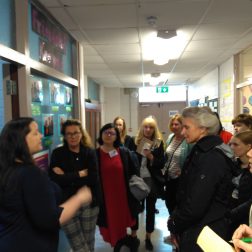Sirius study visit in Ireland: Delivering Equality of Opportunity in Schools program

St. Mary’s is a primary school situated in Dublin’s north inner city where the 88% of the students has English as an additional language, representing over 30 different nationalities. A place where many languages, cultures and religions meet and co-exist on daily basis.
It is one of 896 Irish schools that in the 2018/2019 school year are in the Delivering Equality of Opportunity in Schools (DEIS) program, the Department of Education and Skills policy instrument to address educational disadvantage.
The action plan focuses on addressing and prioritising the educational needs of children and young people from disadvantaged communities, from pre-school through second-level education (3 to 18 years). The measure target the schools attended by a high concentration of students from disadvantaged areas, identified through the analysis of small-scale statistical and demo-graphic indicators. A Sirius network delegation had the chance to visit the school and met with DEIS program managers, within the framework of a peer learning activity that took place at the beginning of June.

The program has the ultimate goal of improving the learning experience and outcomes of students and several key targets: literacy and numeracy rates, retention rate, wellbeing, progression to further and higher education by under-represented groups, access by under-represented groups to initial teacher education and parental engagement.
The DEIS program represents a big help for St. Mary’s. «It is a huge advantage – explained Éadaoin Kelly, St. Mary’s School Principal -. It gives significant means of funding to support the children. The books and all materials are provided and we can benefit of a good team of support teachers. It conveys all possible measures to take the costs of schooling away from the families».
Besides extra funds that encompass the access to school meals programs, the possibility of opening “Home School Community Liaison” positions for teachers, enhanced guidance allocation, literacy and numeracy supports, the school can also assure a lower class size and get an administrative principal on a lower threshold.

The Home School Community Liaison (HSCL) is one of the distinctive features of DEIS. It is managed by Tusla agency, a state body responsible for improving well-being and outcomes for children. The primary concern of the work ok HSCL coordinators is to promote attendance, participation and retention of children, in consultation with school principals, the educational welfare services and social work services. The “liaison” is a schoolteacher who works as a link between the school, the parents and the community. The mandate last for five years and, after this period, the teacher return to their class. A HSC liason holds information sessions and open days, organises informal meetings (“morning coffees”) to provide general school information, to talk about the importance of attendance, to present available courses for parents and other local supports. If needed, the HSC liaison organises home visits. «The key feature of the scheme is the idea of bringing every type of support and service available to the table, instead of waiting that the parents go door to door», explained Anne-Marie McGovern, Educational Welfare Services manager at Tusla.






